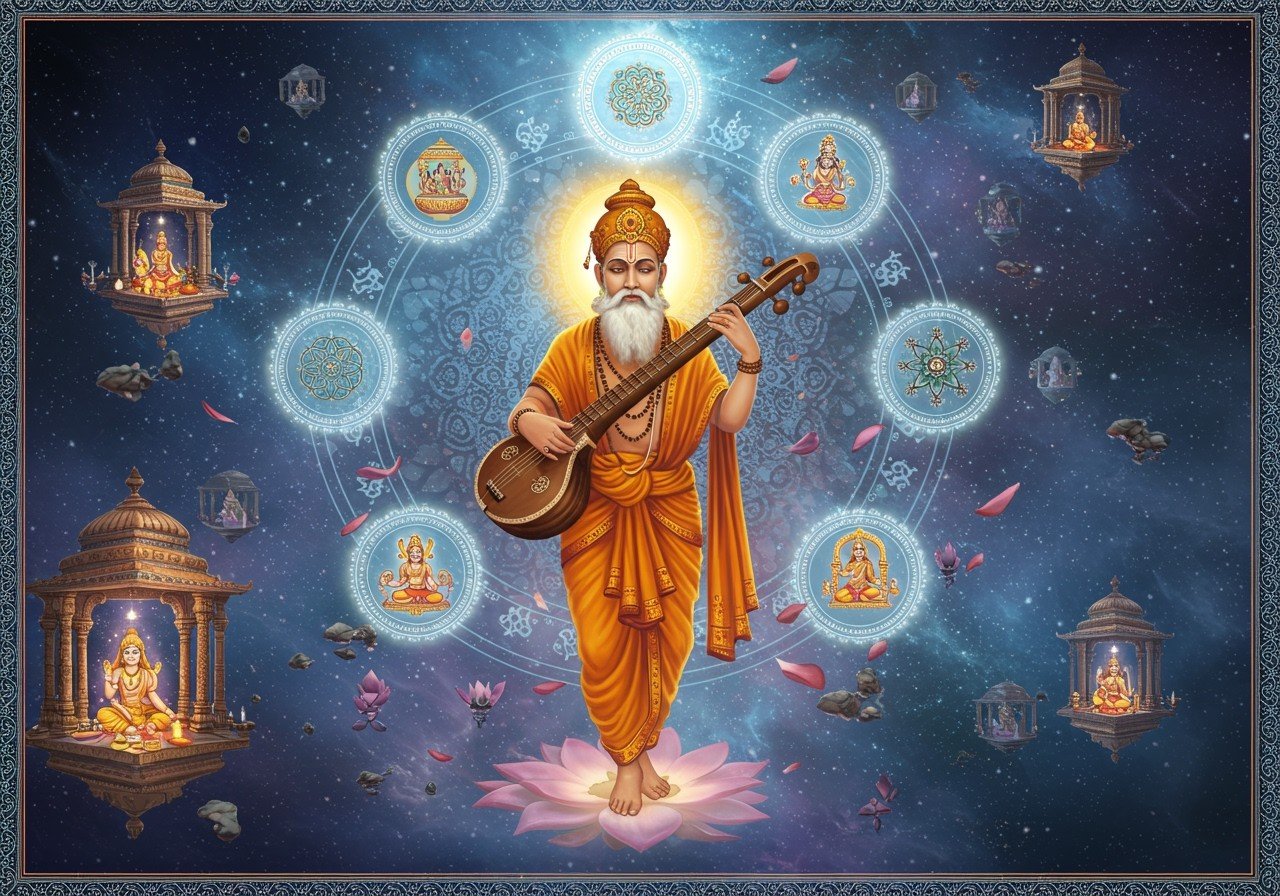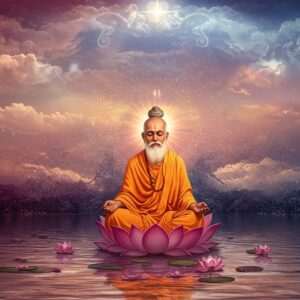
The Narada Pancharatra offers a spiritual path, connecting tradition with modern life. This ancient Sanskrit text guides the worship of Lord Vishnu and forms the basis for temple rituals. It holds a significant place in Hinduism, influencing practices even today. Understanding its teachings can strengthen cultural ties and foster spiritual growth. Poojn.in offers a wide variety of products for your spiritual journey. Discover our collection of Bel malas, Tulsi malas, and other sacred items here.
What is the Narada Pancharatra?
The Narada Pancharatra, a core scripture within the Vaishnava tradition, centers on the worship of Lord Vishnu, outlining temple rituals and deity worship. This ancient text, also known as Jnanamritasara (“the essence of the nectar of knowledge”), is presented as a dialogue between Lord Shiva and the sage Narada and is attributed to Srila Vyasadeva. The text encompasses:
- Philosophical discussions exploring the nature of reality and the divine. These discourses delve into profound concepts such as the relationship between the individual soul and the Supreme Being.
- Detailed ritual instructions, providing step-by-step guidance for conducting ceremonies and offerings. This practical aspect allows devotees to engage in meaningful worship.
- Guidelines for temple construction and design, ensuring sacred spaces are built in harmony with spiritual principles. This includes the proper placement of deities and the creation of a conducive environment for worship.
Its focus on Bhakti, or devotion, has profoundly shaped Vaishnavite practices. This sacred text provides a structured approach to worship and spiritual discipline, emphasizing the connection between the devotee and the divine.
Authorship, History, and Origins
While traditionally attributed to the sage Narada, the true authorship of the Narada Pancharatra is a subject of scholarly discussion. Often linked to Srila Vyasadeva, the text portrays a conversation between Lord Shiva and Narada, imparting wisdom and guidance. It likely originated between the 3rd and 8th centuries CE, during the rise of the Bhakti movement in India. It contributed significantly to the development of devotional practices within Hinduism, and its teachings have been preserved through both oral and written traditions for centuries.
Core Principles and Teachings
At the heart of the Narada Pancharatra lies devotion to Lord Vishnu, emphasizing the importance of reverence and love for the divine. It meticulously details temple rituals, the installation of deities, and worship practices. This attention to detail ensures the proper execution of ceremonies. Philosophical discussions within the text explore the nature of the divine and the soul’s journey towards enlightenment.
The Narada Pancharatra emphasizes personal virtues such as humility, compassion, and self-discipline. These qualities are considered essential for spiritual progress and are encouraged through its teachings. The text’s rich philosophical and practical teachings are further enhanced by its exploration of five branches of transcendental knowledge:
- Knowledge of the Absolute Truth, understanding the ultimate reality beyond the material world. This pursuit of higher knowledge is a central theme.
- Knowledge of liberation, the path to freedom from the cycle of birth and death. The text offers insights into achieving moksha.
- Knowledge of devotional service (Bhakti), cultivating love and devotion for the divine. Bhakti is presented as a powerful means of spiritual advancement.
- Knowledge of mystic yoga, techniques for uniting the individual consciousness with the Supreme. This involves practices like meditation and breath control.
- Knowledge in the mode of ignorance, understanding the nature of illusion and the material world. This knowledge helps devotees transcend limitations.
Contemporary Practice and Relevance
Even today, the Narada Pancharatra continues to shape spiritual practices and temple rituals, particularly in South India where it guides the construction and consecration of temples. Priests trained in the Pancharatra tradition perform these rituals with utmost reverence, ensuring their authenticity. Daily worship practices and festivals dedicated to Lord Vishnu reflect the text’s enduring influence. You can find essential items for these practices on Poojn.in, including Shiva Lingams and Adiyogi statues.
The Narada Pancharatra’s system of worship, considered particularly suitable for the Kali Yuga, involves five steps:
- Abhigamana: Preliminary activities such as waking early, paying respects to the spiritual master, and cleansing oneself. These actions prepare the devotee for worship.
- Upadhanam: Gathering the necessary items for worship, ensuring everything is in place for the rituals. This includes offerings, incense, and other sacred objects.
- Yoga: Connecting the mind with the Supreme Lord through prayers and meditation. This step focuses on inner focus and devotion.
- Ijya: The actual worship of the Lord, offering prayers, mantras, and offerings. This is the culmination of the preparatory steps.
Accessibility and Resources
The Narada Pancharatra is accessible in various formats, including printed books and online resources. The availability of digital versions makes it convenient for those seeking knowledge and guidance. Ensuring the accessibility of such spiritual texts is crucial, especially for diaspora communities looking to reconnect with their cultural and spiritual heritage. Authentic sources are vital for accurate interpretations, fostering a deeper understanding of the Narada Pancharatra’s teachings. Consider exploring finding a guru for personalized guidance on your spiritual path. Poojn.in offers a wide selection of incense and other puja essentials to support your spiritual journey.
Poojn.in: Your Source for Authentic Ritual Items
Poojn.in offers a wide selection of authentic items for your Narada Pancharatra rituals and spiritual practices. Browse our collection of Laddu Gopal statues, sandalwood incense, and rose incense to enhance your devotional practices.
Conclusion
The Narada Pancharatra remains a timeless treasure within Hinduism’s spiritual and cultural landscape. Its teachings on devotion to Lord Vishnu, coupled with its detailed rituals, provide a path towards spiritual growth and understanding. Exploring its core concepts offers guidance that connects ancient wisdom with modern practices. This sacred text continues to inspire those who value their cultural heritage and seek a deeper connection with their faith. May its wisdom illuminate your spiritual journey and strengthen your connection to tradition.


